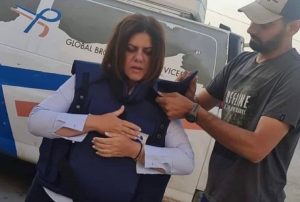London – Seven months after the pregnant journalist Rasha Abdullah al-Haraz lost her life in a bomb attack, a recurring sad incident in Yemen caused a reaction from organizations defending freedom of the press.
Saber al-Haidari, a reporter for Japanese state television NHK, died Wednesday in Aden when his car exploded. He was 42 years old.
According to information obtained from the Gulf Center for Human Rights (GCHR), the powerful explosion of the bomb placed in the journalist’s car killed two more unidentified people traveling with him and injured a third person.
Bombshell journalist worked for Yemen government
Yemen has been at war since 2014 and free journalism is increasingly being suppressed.
According to Reporters Without Borders, the division of the country into zones controlled by Houthi rebels, the so-called legitimate government and southern separatists has further exacerbated the persecution. media. At least 19 journalists were killed at the end of last year.
At the time of the explosion, Saber al-Haidari was driving in the port city of Aden province, in the town of El Mansoura.
The journalist previously worked in the public relations department of the Yemeni government’s Ministry of Information, according to a report by the UK-based Arab network Al Araby.
The Gulf Center for Human Rights group condemned the attack on the media professional in an event that was neither isolated nor rare in the country.
“GCHR is concerned about the continuing attacks on freedom of expression from all directions in Yemen, including the arrests and killings of journalists, some of whom have been sentenced to death for their work, with car bombs.
We demand the immediate and unconditional release of all journalists detained in Yemen, an immediate end to their murders, and an accountability for those responsible.”
read it too
Al Jazeera denies reporter killed by Israeli soldiers victim of crossfire
The Committee to Protect Journalists (CPJ) also protested the bombing of the journalist in Yemen.
Justin Shilad, CPJ’s senior researcher for the Middle East and North Africa, urged the country’s authorities to stop attacking media professionals, while the international community should take a stand against such attacks.
“The murder of journalist Saber al-Haidari in Aden shows the price of the international community’s silence on press freedom in Yemen and how journalists continue to pay a price.”
The Yemen Journalists Syndicate mourned the professional’s death and reminded that foreign media reporters were a “permanent target” of attacks in Aden.
“[Jornalistas] We are the target of deliberate incitement campaigns that lead to the repetition of such terrorist crimes, and we hereby reaffirm the need to provide protection to all our journalistic colleagues.”
Journalist’s death repeated in Yemen
CPJ added that Al-Haidari’s death was part of targeted journalists in Yemen, particularly Aden. Reporter Rasha al-Harazi was killed in a car bomb in November. last year. She was 27 years old and nine months pregnant.
The journalist was accompanied by her husband, journalist Mahud al-Atmi, who was seriously injured in the explosion.
After the bombing, he signaled that the attack came from Iran-backed Houthi rebels, but no group claimed responsibility at the time, according to the Associated Press.
According to GCHR, the state of Aden is under the control of the UAE-backed Southern Transitional Council.
CPJ affirmed that journalists across the country face increased risks and made little recourse to justice during the collapse of law and order in Yemen.
The UN Human Rights Council established an investigative body to independently document the country’s human rights abuses during the conflict, including attacks on journalists, but the council, in agreement with the committee, voted to end the body’s mandate in October 2021.
Yemen is one of the world’s worst countries for press freedom and was ranked 169th in Reporters Without Borders’ (RSF) rating of 180 countries this year – the same ranking as in 2021.
RSF points out that independent reporting is difficult in the country, as the media is controlled by various parties to the conflict and the risk of death from car bombs is high:
“There are very few foreign correspondents on the site. Journalists are closely watched wherever they are and can be arrested for their posts on social media.”
“Militias expose them to violence and harassment, and journalists risk being the target of death threats, assassinations or bombings,” he said.
read it too
source: Noticias
[author_name]
